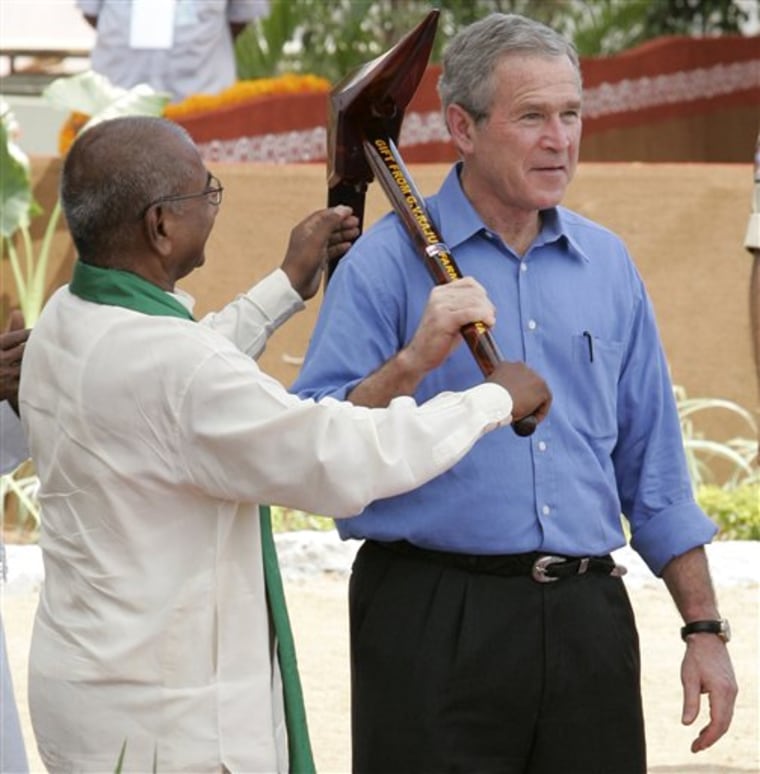Applauding newly warming U.S.-India relations, President Bush said Friday that Americans should not respond to India’s exploding economy by closing itself off to global trade.
“The United States will not give into the protectionists and lose these opportunities,” Bush said in a speech at Purana Qila, a historic fort here. “For the sake of workers in both our countries, America will trade with confidence.”
Bush wrapped up his three-day stay in India with a landmark nuclear deal that is the centerpiece of America’s new romance with this 1 billion-strong democracy, the world’s largest. Later Friday, he was heading to Pakistan for an overnight visit under extraordinary security to a close anti-terror partner struggling with terrorism problems.
Bush said his nation and India will stand together against terrorists.
“They target democracies because they think we are weak and they think we can be frightened and retreat,” Bush said. “Terrorists have misunderstood our countries. Americans and Indians love our freedom and we will fight to keep it.”
Bush focus on opportunityThe president said the United States should see India as a land of opportunity instead of a threat. America’s best response to globalization is not to erect economic barriers to protect workers, but educate them to make sure they can compete on any stage, Bush said.
“In my country, some focus only on one aspect of our trade relations with India — outsourcing,” he said.
An estimated 80 percent of Indians live on less than $2 a day, but India’s middle class has swelled to more than 300 million — a number larger than the entire U.S. population — and India’s exploding economy has created millions of jobs. The country’s outsourcing industry alone is expected to bring in $22 billion in revenue this fiscal year, much of that generated by U.S. companies.
Bush also urged India to lift caps on foreign investment, lower tariffs that penalize American agricultural markets and protect its workers and children from abuses.
“India has responsibilities too,” he said.
Meeting with young entrepeneurs
Earlier Friday, spoke with young entrepreneurs at a business school in Hyderabad, saying that “the classic opportunity for our American farmers and entrepreneurs and small businesses to understand is there is a 300 million-person market of middle class citizens here in India and that if we can make a product they want, that it becomes viable.”
The president flew to Hyderabad to take in both this city’s high-tech activity that is helping to drive rapid economic growth and the rural areas around it that lag behind.
The meeting with business leaders and an earlier tour around the dusty campus of an agricultural college were aimed at showcasing ways the United States and India can cooperate to spur innovation across industries.
India’s boom has created millions of jobs along with consumer demands that have attracted American businesses. A luxury goods market has even emerged, with brands like Louis Vuitton and Rolls Royce setting up shop along with consumer demands that have attracted American businesses.
At Acharya N.G. Ranga Agricultural University, Bush watched Indians using sticks and tools to hand-till soil around young peanuts, tomatoes and soybeans.
Bush was greeted here by the heavy presence of police and paramilitary soldiers. Black flags flew above buildings in the predominantly Muslim Charminar quarter, where shops were closed in protest. Several hundred communist and Muslim demonstrators, chanting “Bush hands off India” and “Bush go home,” carried posters of Osama bin Laden and burned an effigy of the American president.
“We are protesting against George Bush because he is a warmonger,” said B.V. Raghavulu, a leader of the Communist Party of India (Marxist).
There was also a protest against Bush Friday in Srinagar, the summer capital of Indian-controlled Kashmir.
Pakistan up next
Later Friday, Bush was flying to Pakistan for an overnight visit under tight security to a close ally struggling with terrorism problems. An American diplomat and three other people were killed when a suicide attacker rammed a car packed with explosives into theirs. The bombing on Thursday was in Karachi, about 1,000 miles south of Islamabad, the Pakistani capital, where Bush will meet with Pervez Musharraf, the military leader who took power in a 1999 coup.
U.S. officials said there was evidence the U.S. diplomat, foreign service officer David Foy, was targeted.
“Terrorists and killers are not going to prevent me from going to Pakistan,” Bush said at a news conference Thursday in New Delhi with Indian Prime Minister Manmohan Singh.
Also Thursday, Bush and Singh inked a deal for the United States to provide nuclear fuel, reactors and know-how to help this energy-starved nation meet its growing demand for power, while allowing it to continue developing nuclear weapons.
“Yesterday was a way to put the Cold War behind us,” Bush said Friday of the historic nuclear accord.
Eight months in the making, the nuclear accord would reverse decades of U.S. policy and end India’s long isolation as a nuclear maverick that defied world appeals and developed nuclear weapons.
India agreed to separate its tightly entwined nuclear industry — declaring 14 reactors as commercial facilities and eight as military — and to open the civilian side to international inspections for the first time.
The agreement must be approved by Congress, and Bush acknowledged that might be difficult. India still refuses to sign the Nuclear Non-proliferation Treaty, and skeptics worry that India’s military nuclear program would remain outside of international safeguards.
The United Nations’ nuclear watchdog agency, the International Atomic Energy Agency, gave its endorsement, calling the deal “an important step towards satisfying India’s growing need for energy, including nuclear technology and fuel, as an engine for development.”
“It would also bring India closer as an important partner in the nonproliferation game,” IAEA Director-General Mohamed ElBaradei said in a statement.
